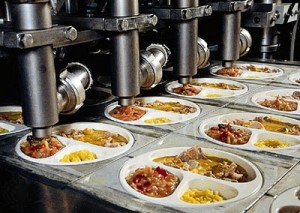Food Revolution continued..
When Did Home Cooking Begin to Decline?
Basically, after World War II things changed – women wanted to work, wanted independence and freedom from the home. However, this made things complicated for families, for domestic relationships. Women seemed happy to delegate other tasks and housework, but cooking was something they enjoyed. Cooking was a time to be with families, and I think in a sense it was and is meditative. When sociologists ask women which domestic activities they like best, cooking ranks rather high. But, as I mentioned, if women were working, there was no longer time to prepare meals from scratch, and therefore men needed to step in. Not to fret, before things grew difficult, the food industry stepped in and said, “We will take care of it.”
Apparently, the food industry had been trying to sneak in for many years before it was actually accepted. It was rejected for many years before it wiggled its way in. The food industry adopted the language of feminism with claims such as: Women’s Liberation. They were very clever and everyone went along because it made things easier. This all began shortly after World War II and was resisted until the sixties and seventies. Although McDonalds began in the forties, the fast food industry did not take off until the seventies and eighties when fast food became a third of what American children eat every day.
Supplementing home cooking with industrial cooking is one of the largest driving forces behind the obesity epidemic, not to mention the growth of so many diseases. Corporations use obscene amounts of sugar, salt and fat because those ingredients are tasty and cheap, bottom line. These ingredients also mask the poor quality of processed foods. Chemicals make anything possible – make foods look pretty, last a long time, taste decently and have “deception” written all over them in invisible marker.
Cooking is the Biggest Deal
Cooking tells the story of mankind. Learning to cook was one of humanities greatest achievements. “Cooking allows our brains to grow and our guts to shrink (Michael Pollan). This allowed for all sorts of cognitive development to take place and is the underlying force in the development of culture. Cooking stood for cooperation, patience, trust, bonding and relationships to take place. Sitting down and eating together is an enormous force in the development of relationships and hugely impacted the rise of civilization. Cooking itself and cooking tools, such as pots and pans, gave way to creation of foods – learning to combine vegetables with meat, make cheese and butter, bread, beer. These processes are critical to our development as humans and as a species, both then and now.
At What Point Did Things Go Awry?
At some point we crossed over from making food more nourishing, more digestible and more delicious to having the exact opposite effect. Up until the nineteenth century, the history of cooking was all in the direction of making food more nutritious. However, in the late nineteenth century we took food to another level. We learned to refine grain and make white flour, we learned how to turn cane and beets into pure sugar, we learned how to pick nutrients apart and manipulate them. For instance, you take raw materials – corn, soy, wheat – and you “add value” by creating processed foods from those building blocks. So instead of selling nutritious brown rice, we genetically engineered white rice that has vitamin A in it and you get “golden” rice. Because sugar is an innate taste, meaning we are born with it, we love it. This made things even easier for the industry because the beauty is that white flour is so cheap and pairs perfectly with this capitalist economy. It’s a commodity and it’s imperishable. The more complex you make a product, the more profitable. Only, we forget that our gut knows differently.
We became too smart for our own good, we were moving from cooking to “food processing.”



Leave a Reply